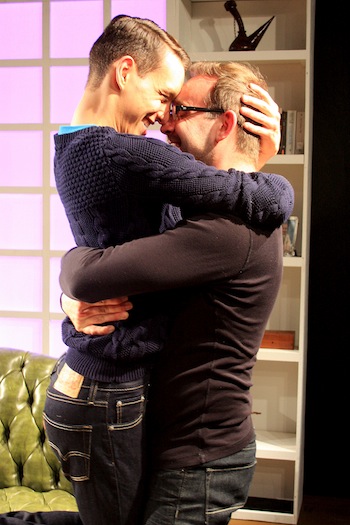Theater Review: “The Submission” — An Engaging Script that Falls Short of Its Ambitions
At first, The Submission comes on as an agreeably edgy satire of the automatic embrace of identity politics and political correctness in the academy and popular culture.
The Submission by Jeff Talbott. Directed by David J. Miller. Presented by Zeitgeist Stage Company at Boston Center for the Arts, Boston, MA, through May 30.

Aina Adler and Victor Shopov in Zeitgeist Stage Company’s “The Submission.” Photo: Richard Hall/Silverline Images.
By Ian Thal
The Submission opens in a Starbucks in New York City. Danny Larson (Victor Shopov), a thirty-something playwright, is anxiously waiting for his fellow dramatist Trevor (Mathew Fagerberg) to finish reading his latest script. Trevor proclaims it to be “authentic” and a work of genius to boot. The play, entitled Call A Spade, focuses on the struggles of an alcoholic African-American woman and her card-shark son. The problem is that — at least outside of Trevor’s eyes — the play isn’t “authentic.” Danny is a middle-class gay white man with no black friends.
After years of writing scripts that garnered only the occasional staged reading, Danny is understandably overjoyed when the prestigious Humana Festival of New American Plays (a real event produced by the Actors’ Theatre of Louisville in Kentucky) accepts his play for a full production. But there’s a catch: afraid that people would think that he doesn’t have the “right” to tell such a story given who he is, Danny submitted his play under the name of Shaleeha G’ntambi. Both Trevor and Danny’s wealthy financial manager boyfriend Pete (Diego Buscaglia) are convinced that the scheme to circumvent the perceived strictures of affirmative action will prove to be disastrous.
Yet they all embrace an additional deception — Danny hires Emilie (Aina Adler), to play the role of playwright. Emilie has some ethical qualms about the scheme, but loves the play so much that she decides to accept Danny’s money and a share of all future proceeds. While trying to pull off the deception, Emilie and Trevor fall in love while Danny attempts to play puppet master, remotely manipulating Emilie through the process of production meetings, casting, rewrites, and rehearsals — all the way to opening night.
Today, many dramatists feel under pressure to represent a more diverse cast of characters, while questioning whether they (or others) have the right to write about people whose experiences are unlike their own. And if they do attempt to jump into other shoes, will it be seen as legitimate or will it be condemned as exploitation? In this script, playwright Jeff Talbott argues that “some guy [sitting] in his middle-class apartment” is capable of imagining other lives, even if there are questions (political, artistic) about whether he has that right.
At first, the play comes on as an agreeably edgy satire of the automatic embrace of identity politics and political correctness in the academy and popular culture. It also touches on the resentful, atavistic backlash that these kind of liberal pieties have inspired. As tensions mount, Danny feels entitled to use words that the African-American community typically reserves for its own, often ironic, use. Emilie eventually feels free to describe Danny with all sorts of emasculating tropes. Predictably, the initially warm relationship between these two allies turned antagonists degenerates to the point that they let fly barrages of racist, homophobic, and misogynist slurs that are transgressively funny until the long foreshadowed “n-word” is finally uttered.
It’s no surprise to all but the most pollyanna-ish of idealists that there are some who mask bigotry behind left-wing platitudes, and that it takes only a little provocation for these masks to slip. And slip they do: both Danny and Emilie demonstrate insensitivity to the specific sorts of suffering that inform the other’s experiences. (The FBI’s 2013 Hate Crime Statistics show them to be members of the two most besieged groups in America. In 2013, 2371 individual blacks or African Americans were targeted in hate crimes; during that period 890 gay males were attacked.) Things get so bad between Danny and Emilie that they even the accuse the other’s community of conspiratorial behavior: Emilie resents gay male theater producers while Danny feels excluded by Black History Month.
Talbott has had a decades-long career as an actor, and The Submission is filled with the sort of meaty dialogue and character interactions that actors love to sink their teeth into. The Zeitgeist Stage Company cast comes up with one of the best ensemble performances I’ve seen in a fringe show in quite a while. But The Submission also has a plot hole so large that a different play could be comfortably staged inside it – and it’s clearly not the one that Danny has written. Indeed, while Talbott gives every one of his characters a particular voice, Danny’s writing for the stage comes across as lazy and cliché-ridden – and that woodenness is exceeded only by Emilie’s rambling when she attempts to speak extemporaneously in front of an audience at the play’s premiere. But at least that character has an excuse: she’s an actress used to memorizing scripts, not a playwright.
The catch is that The Submission is saddled with too many implausibilities that go well beyond what can be tolerated in either a farce or a satire. It’s one thing to turn a reasonably protective dramatist into a bullying control freak. But Danny is so incurious and dismissive of other people’s experiences, so unaware of the racial coding of the language he uses, that it is hard to imagine he could write anything credible about working-class African-American families. Indeed, all the listicles and YouTube videos with such titles as “Ten Things White People Need To Stop Saying To Their Black Friends” are written for people just like him. How could Emilie, the literary office at Humana, or anyone working on the production possibly conclude that a play written by Danny was an “authentic” portrait of African-American life? Is everybody in the theater world brainwashed to the point that their notion of ‘the real” is rooted in the same pop culture cliches and political correctness strictures absorbed by Danny and Trevor? If that’s the case, Talbott’s script never considers a possibility that darkly and daringly comic. Is Danny really that much of an emotional idiot savant, or does Talbott imagine that the staff of the Humana Festival is haplessly gullible?
The more you think about Talbott’s set-up the more tenuous it becomes: where does Danny get the money to pay Emilie a living wage for the several weeks she plays the role of Shaleeha? Whence comes the cash to fly the entire entourage to and from Louisville? Is he independently wealthy? Is Pete, despite his unwavering belief that it is all a disaster waiting to happen, bankrolling the entire scheme?
That said, The Submission captures some of the grim, bottom line mechanics of the new play sector. Trevor observes that Call A Spade is “so producible: four characters, one set.” The script also explores the difficulty playwrights have in receiving a production. And when they do get the nod, there’s the (at times) grueling back-and-forth of ‘collaboration’ during the development process (which I have elsewhere described as “The Dramaturgical Black Box”). While the play focuses on the ambivalence some in the theater world have about actors who also write, The Submission ignores the considerable obstacles a fictitious young playwright like Shaleeha G’ntambi would face in having her work professionally produced. No matter how brilliant she was, she would hit road block after road block — unless she won a coveted membership in a group that have pleased the gatekeepers who run MFA playwriting programs and make selections for the most prestigious fellowship programs.

(L to R): Diego Buscaglia and Victor Shopov in Zeitgeist Stage Company’s staging of “The Submission.” Photo: Richard Hall/Silverline Images
As noted earlier, the ensemble gives uniformly excellent performances. Working with the undeniable strengths of Talbott’s dialogue, the performers manage to engage the viewer even after he or she cottons onto the play’s narrative failings. Shopov and Adler conspire, admire, and break into hostilities with zesty aplomb; Adler and Fagerberg flirt convincingly, and Buscaglia neatly captures Pete’s mix of cynic and caretaker. Of course, Shopov is at the center of the action, and he provides a virtuouso performance, even as Danny becomes increasingly unsympathetic and implausible.
Though this is my rookie review of a Zeitgeist Stage Company production, it’s not my first time attending one of the company’s productions. Director David J. Miller’s predilection for handling political and personal conflict is as deft as always – arguably more skillful than the playwright’s. Despite the contrivances of the plot, realism is the order of the day – indeed, there’s nothing specifically theatrical about this play that couldn’t also be done on film or television.
Miller, who also serves as scenic designer, neatly suggests the uniform look of the Starbucks corporation as well as the showy luxury that Pete’s job affords both him and Danny. Shopov also doubles as the production’s costume designer: not satisfied with simply creating costumes, he supplies entire wardrobes, dressing each character in a distinctive style. Danny is suspended between scruffiness and keeping-up-appearances: he has nice leather shoes, but they have holes in their soles (clearly a visual pun on “soul”). When he takes them off, his black socks are threadbare. Peter is fashionable, tailored for his position in the corporate world. He has one eccentric streak — patterned socks that change from scene to scene. Emilie is a connoisseur of the consignment shop, dressed in colors and textures that evoke bohemian elegance; add Adler’s mohawk and you have counter-culture cred as well. Trevor is your standard hipster in tight jeans, his upper body arrayed in various floppy knit-caps and cool sweaters.
J. Jumbelic’s sound design is so real it is a bit unnerving — the characters often meet in a Starbucks, a location that is plugged into mobile technology, filled with the electronic sounds emitted by cell phones, computers, and the typing of text messages. The musical playlists piped into these interchangeable coffeehouses is the icing (or is that a shroud?) on the sonic cake.
Ian Thal is a playwright, performer and theater educator specializing in mime, commedia dell’arte, and puppetry, and has been known to act on Boston area stages from time to time, sometimes with Teatro delle Maschere. Two of his short plays appeared in theater festivals this past summer. He has performed his one-man show, Arlecchino Am Ravenous, in numerous venues in Massachusetts and Rhode Island. One of his as-of-yet unproduced full-length plays was picketed by a Hamas supporter during a staged reading. He is looking for a home for his latest play, The Conversos of Venice, which is a thematic deconstruction of Shakespeare’s The Merchant of Venice. Formerly the community editor at The Jewish Advocate, he blogs irregularly at the unimaginatively entitled From The Journals of Ian Thal, and writes the “Nothing But Trouble” column for The Clyde Fitch Report.
Tagged: Aina Adler, David J. Miller, Jeff Talbott, politically incorrect, The Submission, Victor Shopov
